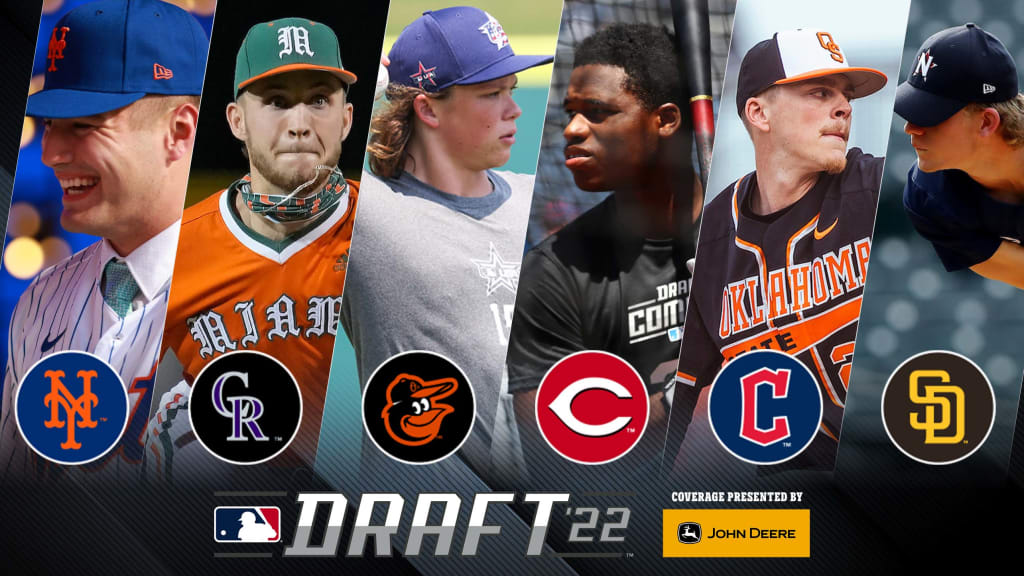
LOS ANGELES -- The Mets' 2021 Draft didn't work out as planned. New York manipulated its bonus-pool money to be able to afford a $6 million bonus for No. 10 overall pick Kumar Rocker, but didn't have a backup plan for utilizing the savings after not signing the Vanderbilt right-hander over concerns about his elbow.
The Mets spent just $4.3 million on their Draft, the second-lowest total in baseball, and came away with just one player ranked in MLB Pipeline's Top 100. But they should feel much better about their 2022 effort.
Armed with an extra first-round pick as compensation for not signing Rocker, they had two of the top 14 selections. Potential top-five choice Kevin Parada fell in their laps at No. 11 and they followed up three picks later with one of the best high school hitters and runners in Texas prep shortstop Jett Williams. When three days of drafting came to a conclusion right before the All-Star Game, no team had hauled in more talent than New York.
Yes, we know it's way too early to have any certainty about how the 2022 Draft will play out. But based on first impressions, and the assumption that every player selected in the 10 first rounds will turn pro, these six clubs fared the best:
1. Mets
New York got more than Parada, a Georgia Tech catcher who was one of the best all-around hitters in the college class, and Williams, a 5-foot-8 sparkplug beloved by scouts. The Mets concluded the first day with Tennessee right-hander Blade Tidwell (second round), a likely mid-first-rounder before he missed the first six weeks of the season with shoulder trouble, and Washington D.C. high school outfielder Nick Morabito (supplemental second), who combines hitting ability with plus raw power and speed. The hits kept coming afterward, including a power arm in Florida righty Brandon Sproat (third) and offensive upside in California prep third baseman Jacob Reimer (fourth).
2. Rockies
Colorado was the only club to land three of MLB Pipeline's 30 highest-rated prospects and one of just two (along with the Reds) to grab 10 Draft Top 250 prospects in the first 10 rounds. Also the lone team with three picks before the second round, Colorado turned those into one of the best college starters (Gonzaga right-hander Gabriel Hughes, first round), a quality college bat (Florida outfielder Sterlin Thompson, supplemental first) and one of the top college all-around athletes (Tennessee outfielder Jordan Beck, supplemental first). Want more superlatives? Washington prep righty Jackson Cox's curveball (second), Kentucky shortstop Ryan Ritter's glove (fourth) and Mississippi State outfielder Brad Cumbest's raw power (ninth) all ranked among the best in this Draft.
3. Orioles
Baltimore parlayed the No. 1 overall pick into Oklahoma high school shortstop Jackson Holliday, a potential five-tool shortstop with similarities to Bobby Witt Jr. and more advanced hitting ability at the same stage. The Orioles spent the rest of the first day adding college power with California outfielder Dylan Beavers (supplemental first), Clemson third baseman Max Wagner (second) and Florida outfielder Jud Fabian (supplemental second). Oklahoma State right-hander Nolan McLean (third) also offers huge pop as a third baseman, but Baltimore announced him as a pitcher -- he hits 98 mph with his fastball and owns a pair of power breaking pitches. Texas catcher Silas Ardoin (fourth) was the best defensive backstop in the college ranks.
4. Reds
Cincinnati matched the Rockies with 10 Draft Top 250 prospects, beginning with sweet-swinging Chipola JC (Fla.) third baseman Cam Collier (first), who seemed destined for the first 10 picks before falling to No. 18. The Reds spent all four of their first-day selections on position players, including slugging Florida high school third baseman Sal Stewart (supplemental first), strong-armed Mississippi State catcher Logan Tanner (second) and line drive-hitting Oregon State outfielder Justin Boyd (supplemental second). Then they shifted their focus and used 11 of their next 13 choices on pitchers, including polished Florida State left-hander Bryce Hubbart (fourth) and live-armed Chipola right-hander Kenya Huggins (fifth).
5. Guardians
James Madison outfielder Chase DeLauter (first) had the best combination of tools, plate discipline and performance among college hitters, yet Cleveland was able to snag him at No. 16. The Guardians excel at enhancing refined college arms, and they grabbed three in Oklahoma State right-hander Justin Campbell (supplemental first), Florida State left-hander Parker Messick (second) and Mississippi righty Dylan DeLucia (sixth). DeLucia won Most Outstanding Player honors at the College World Series. They also added several premier contact hitters, starting with high-energy Arizona State outfielder Joe Lampe (third), and a pair of real talent values in high school arms Jackson Humphries (eighth) and Jacob Zibin (10th).
6. Padres
San Diego isn't afraid to gamble and exercised two of its top four picks on right-handers coming off Tommy John surgery. Georgia prepster Dylan Lesko (first) was on course to be the first pitcher drafted and Duke's Henry Williams (third) was headed toward the first round before their elbows blew out. Iowa righty Adam Mazur (second) also would have gone earlier had he not had back issues toward the end of the college season. The Padres snared arguably the top high school left-hander, Robby Snelling (supplemental first) with the No. 39 overall choice. Their top position-player pick was Maryland high school Lamar King (fourth), who had late helium.
